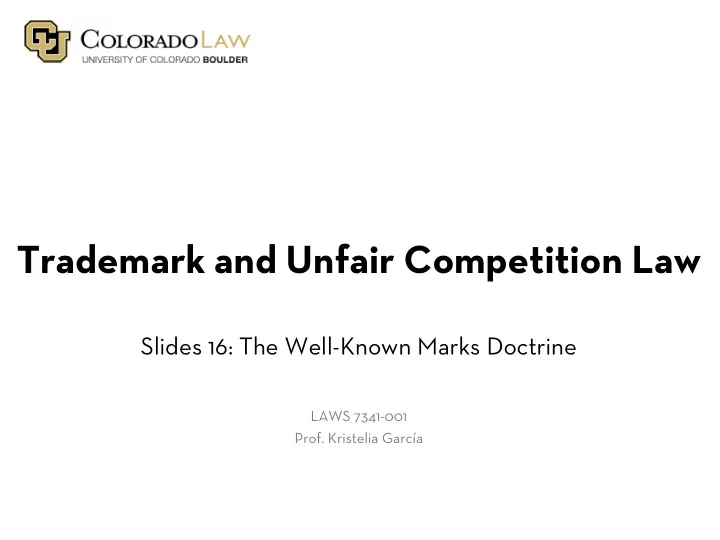

Trademark and Unfair Competition Law Slides 16: The Well-Known Marks Doctrine LAWS 7341-001 Prof. Kristelia García
Class Outline • The Well-Known (”Famous”) Marks Exception 2
Grupo Gigante 3
Grupo Gigante Chronology • 1962 : Grupo begins using GIGANTE mark for supermarkets in Mexico • 1963 : Grupo registers GIGANTE mark under Mexican law • 1991 : Dallo begins using GIGANTE mark for supermarkets in California • 1998 : Grupo registers GIGANTE mark in California in June; Dallo does the same in July • 1999 : Grupo opens its first store in the U.S. 4
The Principle of Territoriality • Normally, first in time = first in right… • “Priority of trademark rights in the United States depends solely upon priority of use in the United States, not on priority of use anywhere in the world.” • i.e., trademarks stop at the “water’s edge.” • In other words, rights are specific to individual nations, and rights in one nation do not give you rights in another. (What does that mean for multi-national firms?) 5
“Famous Marks” Exception to the Territoriality Principle • Usual Rule: no TM rights if no use in the US • Exception: for “well-known marks” • To qualify for the exception, a “substantial percentage” of consumers in the relevant market must be familiar with the foreign mark. • Court to consider: – Did defendant intentionally copy mark? – Are customers of US firm likely to think they are patronizing foreign firm that uses mark? 6
The Grupo Gigante Aftermath: 1. Dallos Gigante stores in So Cal are rebranded 7
2. Mexican Grupo Gigante stores rebranded “Soriana” 8
3. US Grupo Gigante stores rebranded “El Super” 9
10
11
Possible Sources for the “Famous Marks Exception” in the Lanham Act: Lanham Act 43(a)(1)(A): (1) Any person who, on or in connection with any goods or services, or any container for goods, uses in commerce any word, term, name, symbol, or device, or any combination thereof, or any false designation of origin, false or misleading description of fact, or false or misleading representation of fact, which— (A) is likely to cause confusion, or to cause mistake, or to deceive as to the affiliation, connection, or association of such person with another person, or as to the origin, sponsorship, or approval of his or her goods, services, or commercial activities by another person, . . . shall be liable in a civil action by any person who believes that he or she is or is likely to be damaged by such act. Lanham Act 44(b): Any person whose country of origin is a party to any convention or treaty relating to trademarks, trade or commercial names, or the repression of unfair competition, to which the United States is also a party, or extends reciprocal rights to nationals of the United States by law, shall be entitled to the benefits of this section under the conditions expressed herein to the extent necessary to give effect to any provision of such convention, treaty or reciprocal law, in addition to the rights to which any owner of a mark is otherwise entitled by this Act. Lanham Act 44(h): Any person designated in subsection (b) of this section as entitled to the benefits and subject to the provisions of this Act shall be entitled to effective protection against unfair competition, and the remedies provided herein for infringement of marks shall be available so far as they may be appropriate in repressing acts of unfair competition. 12
TRIPS Article 16(2) Article 6bis of the Paris Convention (1967) shall apply, mutatis mutandis, to services. In determining whether a trademark is well-known , Members shall take account of the knowledge of the trademark in the relevant sector of the public, including knowledge in the Member concerned which has been obtained as a result of the promotion of the trademark. 13
Firms Must Register in Every Nation Where They Do Business 14
Recommend
More recommend